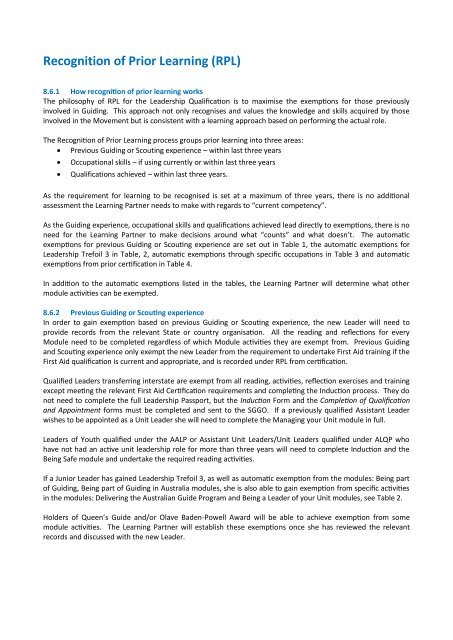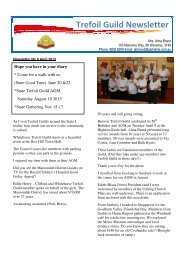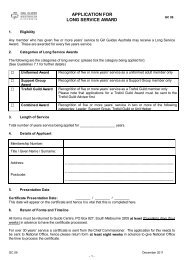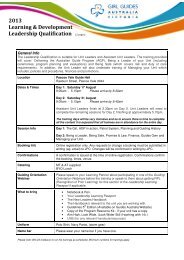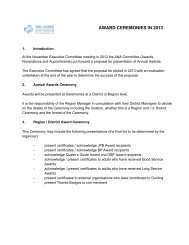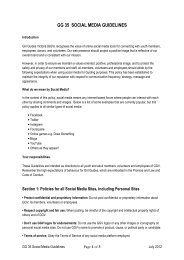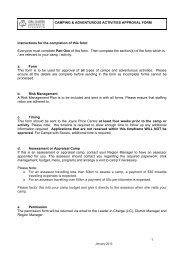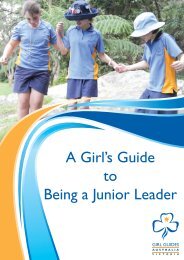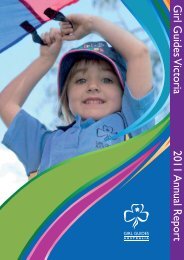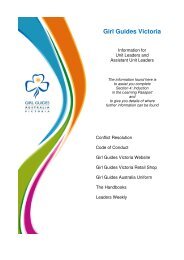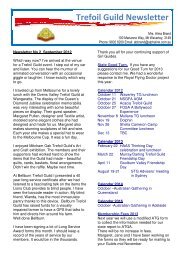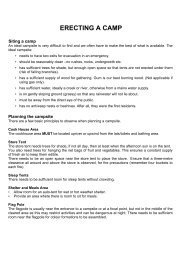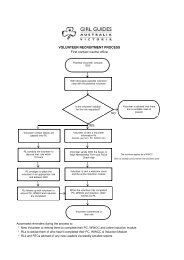Recognition of Prior Learning Statement
Recognition of Prior Learning Statement
Recognition of Prior Learning Statement
You also want an ePaper? Increase the reach of your titles
YUMPU automatically turns print PDFs into web optimized ePapers that Google loves.
<strong>Recognition</strong> <strong>of</strong> <strong>Prior</strong> <strong>Learning</strong> (RPL)<br />
8.6.1 How recognition <strong>of</strong> prior learning works<br />
The philosophy <strong>of</strong> RPL for the Leadership Qualification is to maximise the exemptions for those previously<br />
involved in Guiding. This approach not only recognises and values the knowledge and skills acquired by those<br />
involved in the Movement but is consistent with a learning approach based on performing the actual role.<br />
The <strong>Recognition</strong> <strong>of</strong> <strong>Prior</strong> <strong>Learning</strong> process groups prior learning into three areas:<br />
Previous Guiding or Scouting experience – within last three years<br />
<br />
<br />
Occupational skills – if using currently or within last three years<br />
Qualifications achieved – within last three years.<br />
As the requirement for learning to be recognised is set at a maximum <strong>of</strong> three years, there is no additional<br />
assessment the <strong>Learning</strong> Partner needs to make with regards to “current competency”.<br />
As the Guiding experience, occupational skills and qualifications achieved lead directly to exemptions, there is no<br />
need for the <strong>Learning</strong> Partner to make decisions around what “counts” and what doesn’t. The automatic<br />
exemptions for previous Guiding or Scouting experience are set out in Table 1, the automatic exemptions for<br />
Leadership Trefoil 3 in Table, 2, automatic exemptions through specific occupations in Table 3 and automatic<br />
exemptions from prior certification in Table 4.<br />
In addition to the automatic exemptions listed in the tables, the <strong>Learning</strong> Partner will determine what other<br />
module activities can be exempted.<br />
8.6.2 Previous Guiding or Scouting experience<br />
In order to gain exemption based on previous Guiding or Scouting experience, the new Leader will need to<br />
provide records from the relevant State or country organisation. All the reading and reflections for every<br />
Module need to be completed regardless <strong>of</strong> which Module activities they are exempt from. Previous Guiding<br />
and Scouting experience only exempt the new Leader from the requirement to undertake First Aid training if the<br />
First Aid qualification is current and appropriate, and is recorded under RPL from certification.<br />
Qualified Leaders transferring interstate are exempt from all reading, activities, reflection exercises and training<br />
except meeting the relevant First Aid Certification requirements and completing the Induction process. They do<br />
not need to complete the full Leadership Passport, but the Induction Form and the Completion <strong>of</strong> Qualification<br />
and Appointment forms must be completed and sent to the SGGO. If a previously qualified Assistant Leader<br />
wishes to be appointed as a Unit Leader she will need to complete the Managing your Unit module in full.<br />
Leaders <strong>of</strong> Youth qualified under the AALP or Assistant Unit Leaders/Unit Leaders qualified under ALQP who<br />
have not had an active unit leadership role for more than three years will need to complete Induction and the<br />
Being Safe module and undertake the required reading activities.<br />
If a Junior Leader has gained Leadership Trefoil 3, as well as automatic exemption from the modules: Being part<br />
<strong>of</strong> Guiding, Being part <strong>of</strong> Guiding in Australia modules, she is also able to gain exemption from specific activities<br />
in the modules: Delivering the Australian Guide Program and Being a Leader <strong>of</strong> your Unit modules, see Table 2.<br />
Holders <strong>of</strong> Queen’s Guide and/or Olave Baden-Powell Award will be able to achieve exemption from some<br />
module activities. The <strong>Learning</strong> Partner will establish these exemptions once she has reviewed the relevant<br />
records and discussed with the new Leader.
Table 1: Automatic Exemptions from Module Activities and Training due to previous Guiding or Scouting<br />
experience<br />
Previous Role<br />
Youth Members<br />
New Leaders who have been youth<br />
members for at least one year <strong>of</strong><br />
the previous three years.<br />
Overseas Leaders<br />
Leaders who were qualified Guide /<br />
Girl Scout Leaders in another<br />
country.<br />
Scout Leaders<br />
Leaders who are qualified<br />
Australian Scout Leaders.<br />
Leaders from other Australian<br />
States<br />
Leaders who gained their<br />
Leadership Qualification in a<br />
different Australian state.<br />
Exemptions from Module Activities<br />
(Reading and reflections<br />
must still be completed)<br />
Being part <strong>of</strong> Guiding<br />
Being part <strong>of</strong> Guiding<br />
Being a Leader <strong>of</strong> your Unit<br />
Being a Leader <strong>of</strong> your Unit<br />
Exempt from all module activities, reading<br />
and reflections as already a qualified Leader.<br />
But, will need to meet State or Territory<br />
regulations as part <strong>of</strong> the Induction process.<br />
Exemptions from Guide<br />
Training<br />
Guiding Orientation<br />
Webinar<br />
Guiding Orientation<br />
Webinar<br />
Leadership<br />
Qualification Training<br />
Table 2: Automatic Exemptions due to achievement <strong>of</strong> Leadership Trefoil 3<br />
Leadership Trefoil 3 and/or<br />
Leadership Focus<br />
Exemptions from Module Activities<br />
(Reading and reflections<br />
must still be completed)<br />
Exemptions from<br />
Guide Training<br />
Being part <strong>of</strong> Guiding Full exemption Full exemption<br />
Being part <strong>of</strong> Guiding in Australia Full exemption Full exemption<br />
Delivering the AGP Exemption from activities: 2,3,5, 6,7,11,12 NO exemption<br />
Being a Leader <strong>of</strong> your Unit Exemption from activities: 2-6 NO exemption<br />
Being Safe NO exemption NO exemption<br />
Managing your Unit NO exemption NO exemption
Teacher /<br />
Outdoor Ed<br />
Teacher<br />
Youth Leader<br />
other org.<br />
Child Care<br />
Worker<br />
Teacher<br />
Assistant<br />
Qual Outdoor<br />
Activity<br />
Instructor<br />
Local Sports<br />
Coach<br />
Counsellor e.g.<br />
Social Worker<br />
Religious<br />
Leader<br />
Nurse, Doctor,<br />
Ambulance<br />
Worker<br />
Business<br />
Manager<br />
Accountant<br />
8.6.3 Occupational skills<br />
The Module activities that new Leaders can gain exemption from based solely on occupation are limited because<br />
all the activities are very much Guiding-centric. No automatic exemptions due to occupation apply to the<br />
following module activities: Being part <strong>of</strong> Guiding, Being part <strong>of</strong> Guiding in Australia, Delivering the AGP and<br />
Being Safe.<br />
The table below provides an example <strong>of</strong> the activities which some <strong>of</strong> the more common occupations provide<br />
exemption from. However, the occupation list is not exhaustive and thus the <strong>Learning</strong> Partner needs to use their<br />
common sense to make a decision about exemption. If a new Leader has an occupational background which is<br />
not listed, but would seem to provide a case for exemption, the <strong>Learning</strong> Partner should contact the State RPL<br />
Adviser for clarification.<br />
In addition, some occupations provide exemption from the requirement to achieve a First Aid qualification as<br />
follows:<br />
Emergency doctor or nurse<br />
<br />
<br />
Ambulance worker or paramedic<br />
General Practitioners with current vocational registration.<br />
Table 3: Example exemptions due to occupation / pr<strong>of</strong>essional experience<br />
Module Activity<br />
(other activities may be exempt<br />
depending on occupation)<br />
Being a Leader <strong>of</strong> your Unit<br />
3. Welcome parents or visitors<br />
to the Unit.<br />
<br />
Managing your Unit<br />
5. Keep financial records.<br />
6. Budget for an event/camp.<br />
9. Keep a record <strong>of</strong> programs<br />
and activities, correspondence<br />
and minutes <strong>of</strong> the Unit
8.6.4 Previous qualifications<br />
There is limited recognition <strong>of</strong> learning based on previous qualifications. Once any relevant certificates have<br />
been checked, the date and provider should be recorded in the <strong>Learning</strong> Plan and a copy or scan <strong>of</strong> the<br />
certificate should be sent to the State Office. If in any doubt about equivalence, e.g. gained in another State or<br />
country, speak to the State RPL Adviser.<br />
Table 4 Automatic Exemptions due to commonly held qualifications<br />
Module Activity/First Aid Training<br />
Being Safe<br />
Provide Basic Emergency Life Support<br />
(PBELS).<br />
Level 1<br />
First Aid<br />
Qualification<br />
Level 2/Senior<br />
First Aid<br />
Qualification<br />
Basic Food<br />
Hygiene<br />
Qualification<br />
7. Use safe food handling procedures. <br />
<br />
<br />
Financial or<br />
Book-keeping<br />
Qualification<br />
Managing your Unit<br />
Provide Basic Emergency Life Support<br />
(PBELS)<br />
<br />
5. Keep financial records. <br />
6. Budget for an event/camp. <br />
<br />
The <strong>Recognition</strong> <strong>of</strong> <strong>Prior</strong> <strong>Learning</strong> should be summarised in the appropriate table in Section 3 <strong>of</strong> the <strong>Learning</strong><br />
Passport and the resultant exemptions recorded in the second table in Section 3 <strong>of</strong> the <strong>Learning</strong> Passport. The<br />
relevant activities in Section 5 can then be signed-<strong>of</strong>f.<br />
If the <strong>Learning</strong> Partner has any doubts about how to apply RPL, questions should be referred to the State (or Region)<br />
RPL Adviser.


